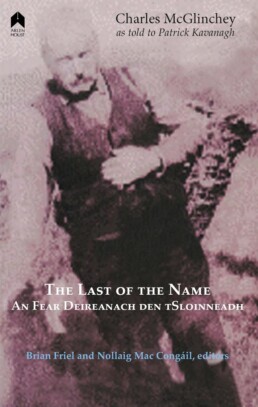
Charles McGlinchey
The Last of the Name : An Fear Deireanach den tSloinneadh
as told to Patrick Kavanagh
Brian Friel and Nollaig Mac Congáil, editors
ISBN:
9781851321308
9781851321315 limited edition
Available from
Arlen House
“So whenever I die, they will know where to bury me. And after my day the grave will not be opened again, for I’m the last of the name.”
Charles McGlinchey (1861–1954), weaver and tailor, lived his entire life on the Inishowen peninsula in Donegal. Never married, he outlived his sisters and brothers, none of whom left an heir, and so became ‘the last of the name’. On winter evenings in the 1940s and 1950s the local schoolmaster, Patrick Kavanagh, would visit McGlinchey to talk about his life and times. Master Kavanagh kept a careful record of his friend’s words and decades later his son Desmond passed the handwritten manuscript to Brian Friel who edited it into this present form. McGlinchey also started an Irish language version, An Fear Deireanach den tSloinneadh, which has been edited by Nollaig Mac Congáil.
Here, thanks to the work of a master dramatist and a senior academic, is a voice that transports us to a period now beyond the grasp of living memory, telling a story that is at once autobiography, a compendium of folklore and a vivid account of the life and times of a particular community in the north-west of Ireland. The work is credible and intimate, as powerful and uniquely affecting as any of the classics of this genre.
Meentiagh Glen is an important place, not in itself but because an astute man observed it with love and his observations bestow an importance on it, elicited its importance from it. And that simultaneous bestowing and eliciting is the act of art. The Last of the Name is the work of an artist.
– Brian Friel
The Last of the Name represents the life work of two extraordinary Inishowen men, and although it is a posthumous publication, it already feels like a minor classic. By his subtle care for the story which Charles McGlinchey had to tell and for the words in which he told it, Patrick Kavanagh maintained the great tradition of those Irish country schoolmasters who have helped to give voice to the local cultures which they loved and served. This is a book full of emotional truth and the beauty of immediate, trusting speech, overbrimming with folklore of great imaginative richness.
– Seamus Heaney
